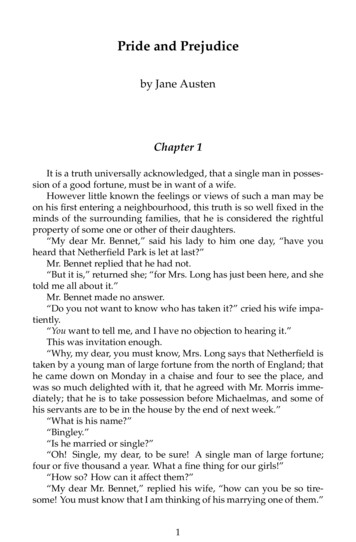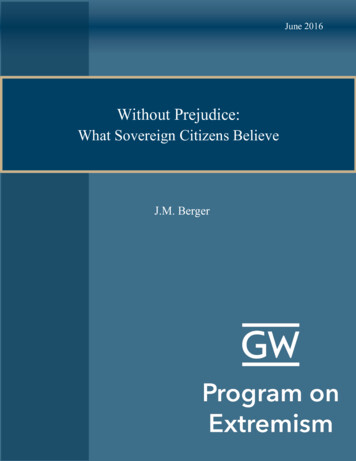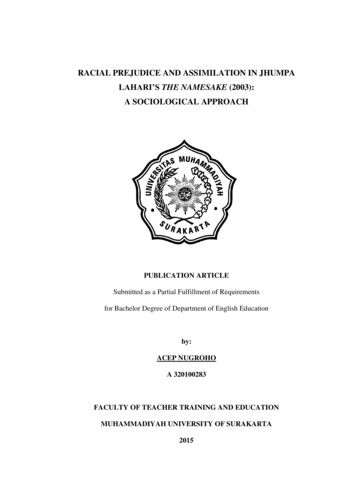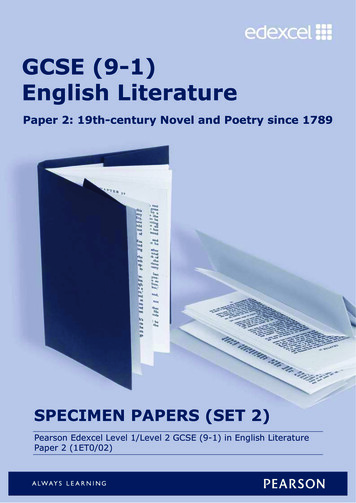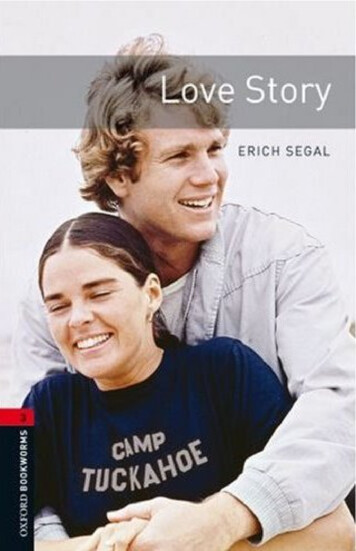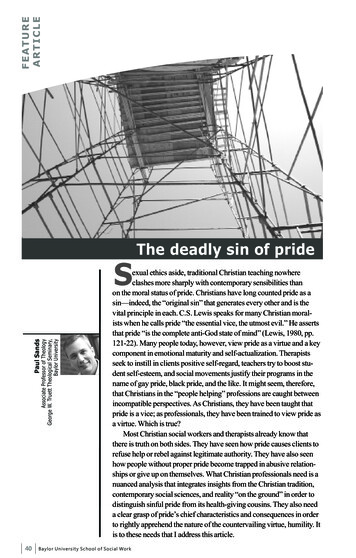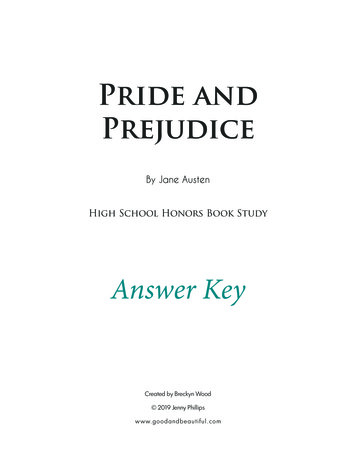
Transcription
Pride andPrejudiceBy Jane AustenHigh School Honors Book StudyAnswer KeyCreated by Breckyn Wood 2019 Jenny Phillipsw w w.goodandbeautiful.com
Book Study — Pride and Prejudice7SECTION 1Chapters 1–12IntroductionWelcome to the Pride and Prejudice Honors Book Study!You will use this book study as a guide while you readPride and Prejudice, a story full of sly humor and loving,though sometimes frustrating, family relationships.tumult2. I lost my purse in theof everyoneleaving after the concert.conjecture about what their3. Parents like tochildren will be when they grow up.countenance kept his4. The teacher’s sternstudents in line.mien5. The woman’s easy and pleasantmade everyone like her.amiable6. George is anman who is kind toeveryone he meets.7. The nicely dressed man was toosupercilious tosit on the ground at the picnic with everyone else.The goal of The Good and the Beautiful Book Studies isto strengthen both your mind and your heart. This bookstudy is broken into six sections. Complete each sectionas you read the corresponding chapters in the book.Using the book study as a guide will give you a greaterappreciation for the rich language, meaningful messages,and well-developed characters in the story.Mark off the Section 1 activities below as you completeeach one in order. When all four are completed, you areready to begin Section 2.o Complete the Vocabulary activity in this section.o Read “Why Great Literature Endures” (pages 9–10).oRead chapters 1 through 12 of Pride and Prejudice.o Complete the Short Answer Questions in this section.VocabularyWrite the correct word in the blank using the word bankon the following page. Use the vocabulary key on pages4–6 when needed.deign1. The actress would notto get outof her limo and speak to the adoring crowd.impertinent that she actually told a8. Lily is soperfect stranger that he needed a haircut!pedantic of you to always correct your9. It isfriends’ grammar in conversation.10. I’m sorry, what did you say? I was lost in a.reverieindolent11. She was tooto bother doing thedishes.12. Do you think the author willcondescend toattend our book club?13. Albert Einstein was the mosteminentphysicist of the twentieth century.laudable young woman saved my life14. Thistoday!15. It is yourfilial responsibility to obey yourparents’ wishes.
Book Study — Pride and Prejudice8Word EVERIESUPERCILIOUSTUMULTShort Answer QuestionsAnswer the following questions. Use a short quote from the book to support each answer.1. In the first two chapters, what does Mrs. Bennet want her husband to do and why?2. What reason does Mr. Darcy give for not wanting to dance at the ball in chapter 3? What reason does he give fornot wanting to dance with Elizabeth in particular?3. Describe Jane Bennet’s personality. How is she different from her sister Elizabeth?4. How do Kitty and Lydia, the two youngest Bennet sisters, spend most of their days? In contrast, what does Maryspend her time doing?5. “Vanity and pride are different things, though the words are often used synonymously. A person may be proudwithout being vain.”“Yes, vanity is a weakness indeed. But pride—where there is a real superiority of mind, pride will be always undergood regulation.”Identify the speaker of each quote. What do you think the speakers mean by the difference between vanity andpride?Answers will vary slightly. Here are some examples.1. Mrs. Bennet wants her husband to visit their new neighbor, Mr. Bingley, so that her girlscanbe introduced to him. She is “thinking of his marrying one of them.”2.Mr. Darcy says he “detests” dancing, “unless [he is] particularly acquainted with [his] partner.” He then says Elizabeth is “not handsome enough to tempt” him into dancing.3.Jane is quiet and reserved but filled with warmth and kindness. She unites “with greatstrengthof feeling, a composure of temper and a uniform cheerfulness of manner.” Lizzie ismoreplayful and outgoing and a little more cynical.4.Kitty and Lydia are silly and idle and spend most days walking to Meryton to gossip withtheir aunt. Mary, on the other hand, reads and studies “human nature,” morality, and music.5.The first quote is said by Mary and the second by Mr. Darcy. In general, vanity means caringtoo much about what other people think of you, particularly your looks or status. Pridemeans caring (perhaps too much) about your own status or accomplishments. Mr. Darcy,since he is a rich gentleman in 1800s England, naturally believes himself to be better than thepoor,uneducated people who are socially beneath him and thus is proud but not vain.
Book Study — Pride and Prejudice11SECTION 2Chapters 13–23Mark off the Section 2 activities below as you complete each one in order. When all arecompleted, you are ready to begin Section 3.oComplete the Vocabulary activity in this section.oRead chapters 13 through 23 of Pride and Prejudice.oRead the Themes and Messages portion of this section.o Complete the Literary Analysis activity in this section.oRead and analyze the Example Response Paper. You will be writing a response paperof your own in Section 3.VocabularyUse the vocabulary key on pages 4–6 to write your own example sentence for each vocabulary word below. Use thepronunciation guide [in brackets] to say each word aloud.1. Amiable:2. Condescend:3. Conjecture:4. Countenance:5. Deign:6. Eminent:7. Filial:8. Impertinent:9. Indolent:10. Laudable:11. Mien:12. Pedantic:13. Reverie:14. Supercilious:15. Tumult:wsrewsnA.yraill v
Book Study — Pride and PrejudiceLiterary AnalysisAnalyzing literature can be an eye-opening experience,especially as you compare widely popular books of lowliterary value with “good and beautiful” books. As youlearned in the last section, too often books are chosenby entertainment value alone, but with good analyticalskills, you will be able to draw conclusions for yourself onwhether a book is worth reading.There are several categories to consider when analyzing abook: entertainment value moral value educational value literary valueIt is very common for entertainment value to be placedhigh on the list of importance. However, being entertainedis not the greatest purpose for literature. It’s alsoimportant to recognize that a book can be entertainingin many different ways. There is the instantly gratifying,constantly thrilling type of entertainment, more like avideo game; then there is entertainment that makesyou work for it, diving deep into beautiful descriptions,complex characters, and profound insights, more liketaking a long walk in the woods while looking for a raretype of flower. When you are not used to the latter type ofentertainment, it may take some time and persistence tocome to fully appreciate and enjoy it. If you persist, yourmind and heart will become more cultivated to a deeper,more fulfilling type of entertainment.In Section 1, you read about moral value of literature.The importance of the moral value in books cannot beexaggerated. List some of the moral messages you havealready discovered in Pride and Prejudice:Answers will vary.13Educational value is how much the reader learns from thebook. Historical fiction, for example, is frequently used toeducate the reader on a certain time, geographical area,person, and/or event through a story. Not all historicalfiction is equally educational, though. Accuracy and detailplay a big part in the educational value of a book.Finally, the literary value is determined by how well-writtena book is. This can be analyzed by paying attention to thesentence structures, literary devices, descriptive writing,and the author’s ability to create believable characters andengage the reader in the story.Jane Austen’s works have tremendous literary value. Theway she subtly wields her extensive vocabulary; her use ofirony, humor, and other literary devices; and her ability toengage the reader in a complicated social environment withmultifaceted characters all combine to create masterpieces.One important rule in good writing is “Show, Don’t Tell,”which means you should try to immerse your audience inthe world of your writing through descriptive language andcompelling scenes instead of just giving a list of facts. Forexample, Austen doesn’t just tell us that Caroline Bingley isa self-centered, tedious person who loves to hear herselftalk. Instead, she gives us multiple scenes wherein Carolinetaunts Mr. Darcy about his admiration for Elizabeth:He listened to her with perfect indifference while shechose to entertain herself in this manner; and as hiscomposure convinced her that all was safe, her witflowed long.That simple phrase, “her wit flowed long,” says so muchabout Caroline Bingley in so few words. As Shakespearewrote, “Brevity is the soul of wit,” so any wit that flowslong isn’t really wit at all; it’s just a lot of hot air.Let’s analyze other examples of “Show, Don’t Tell” in Prideand Prejudice:Pages 1–3:Think back to the very first scene of the book: theconversation between Mr. and Mrs. Bennet about theBingleys’ arrival at Netherfield Park. It is full of quick,clever quips on Mr. Bennet’s side:“I will send a few lines by you to assure him ofmy hearty consent to his marrying whichever hechooses of the girls;”and lengthy, fretful exhortations on Mrs. Bennet’s side:“Mr. Bennet, how can you abuse your own children
Book Study — Pride and Prejudicein such a way? You take delight in vexing me. You have no compassion for my poor nerves.”We learn so much about who Mr. and Mrs. Bennet are from this brief conversation and get a feel for theirpersonalities and motivations, far more than if Austen had spent time describing what they looked like and howthey were dressed. What impressions do you get about Mr. and Mrs. Bennet’s marriage from this first conversation?Answerswill vary but may include some of the following ideas: Mr. and Mrs. Bennet areverydifferent people who argue a lot. They don’t really understand each other well and arenotthe best communicators. Mr. Bennet likes teasing Mrs. Bennet because she’s so silly, andMrs.Bennet takes everything he says too seriously. Their marriage might not be the happiest.Page 71:[T]he agreeable manner in which he immediately fell into conversation, though it was only on its being a wet night,made her feel that the commonest, dullest, most threadbare topic might be rendered interesting by the skill of thespeaker.What do we learn about Mr. Wickham from this first encounter? What do we learn about Elizabeth’s feelings towardhim? Austen could have written, “Mr. Wickham was an interesting speaker, and Elizabeth enjoyed listening to him,”telling us instead of showing. Why is it better to “show” like Austen does, instead of just “tell”?Answerswill vary: Mr. Wickham is smooth and charming and can easily make people likehim.Elizabeth clearly likes him, probably because he makes such a strong contrast to theboringMr. Collins. When Austen “shows” instead of “tells,” the reader enjoys the pleasure ofreadingbetween the lines and seeing more that’s going on beneath the surface.Page 92:She concluded with many good wishes that Lady Lucas might soon be equally fortunate, though evidently andtriumphantly believing there was no chance of it.What do we learn about Mrs. Bennet’s character from this quote? How could Austen have written a similar line, but in away that was “telling” instead of “showing”?Answers will vary: Mrs. Bennet is rather petty and small minded if this is how she acts towards her friends. Austen could have just said “Mrs. Bennet, being petty and selfish, wishedLady Lucas equal good fortune without truly meaning it.” It’s more enjoyable for the readerthat Austen shows us Mrs. Bennet’s character flaws instead of spelling them out for us.Wordy, redundant, or overly flowery writing is not good, but using a variety of sentence lengths and a variety of thefollowing sentence structures helps avoid choppiness and predictability. However, using more complex sentencestructures exercises your brain, giving reading the benefits of increased memory, focus, and attention span. Simple Sentence: consists of only one clause Compound Sentence: consists of two or more independent clauses Complex Sentence: has at least one independent clause, plus at least one dependent clause Compound-Complex Sentence: contains more than one independent clause and at least one dependent clause14
Book Study — Pride and Prejudice15From the chapters you just read, write down one of the sections you highlighted that has high literary value:Answers will vary.Circle the following items that the section contains: “show, don’t tell”; a variety of sentence lengths and structures;personification, simile, or metaphor; sensory language.As you continue to read Pride and Prejudice, try to recognize the entertainment, educational, moral, and literary value.Example Response PaperA response paper discusses your reaction to a text. Aresponse paper is not a summary of the text; it is yourown personal analysis and impressions of what you read.Response papers are written from the first person pointof view, which means you may have phrases such as “Ibelieve” or “I feel.”Writing a response is a wonderful exercise for subjectivethinking, organization, and writing. One of the best waysto learn to write well is to read model writing. Readand analyze the following short response paper, makinga checklist in your notebook of items needed for asuccessful response paper.Pride and Prejudice Response PaperStart with an attentiongrabbing opening, such asa question, quote, shortpersonal experience, or—asin this case—an interestingstatement.Use transitions.by Breckyn WoodPeople say you shouldn’t judge a book by its cover. However, you can judgesomething about a person based on whether or not he or she likes books.At least, Jane Austen seems to thinks so, and I agree with her. In Pride andPrejudice, Austen often uses a love of books and reading as an indication ofgood character and a lack of it as an indication of bad or deficient character.Since Austen was herself a voracious reader and a writer of novels, it makessense that she would be preferential to people who like to read and give thatvaluable trait to her best characters.Let’s look at the evidence. On page 10, we learn the following about Mr.Bennet: “With a book he was regardless of time.” What a lovely way of tellingus he likes to read! All bibliophiles (fancy word for book-lovers) have had theexperience of getting so caught up in a good book that they don’t realize howmuch time has passed. When I read that about Mr. Bennet, I immediately felta connection to him and knew he must be an interesting, thoughtful person.List the title andauthor of the bookin the openingparagraph.T hesis statementUse specif icexamples from thetext, paraphrasedor quoted.
Book Study — Pride and Prejudice17SECTION 3Chapters 24–34Mark off the Section 3 activities below as you completeeach one in order. When all are completed, you are readyto begin Section 4.9. Terrified of public speaking, Cara stepped onto thestage with much .trepidationostentation of the palace’s golden10. Thedecorations was amazing, if a bit ridiculous.oComplete the Vocabulary activity in this section.oRead chapters 24 through 34 of Pride and Prejudice.oComplete the Writing a Response Paper activity in thissection.acquiescence to having his11. The king gave hisportrait hung in the national gallery.Vocabularyincredulous when she came12. The mom washome to a house cleaned perfectly by her children.Write the correct word in the blank using the word bankprovided. (Change the verb tense as necessary.) Use thevocabulary key on pages 4–6 when needed.Avarice1.is an affliction of the soul. It takesthe joy out of being rich.repine2. Don’tabout the bad weather.Tomorrow will be sunny and warm.transient3. High school romances are so ,oftenending before school starts again in the fall.duplicity4. Hisshocked me. I thought he wassuch an honest man.mercenary of you to expect pay5. It iswhen the rest of us are just volunteers.abode6. My grandmother’slaynestled in the woods: a sweet cottage by alake.procure7. My husband managed totickets to see my favorite play for mybirthday.8. Straight-laced Sarah always plansahead and is never subject to a random.capricecandor13. The woman’swas refreshing. Iprefer to hear the truth without any ATIONTREPIDATIONCAPRICE
Book Study — Pride and Prejudice19SECTION 4Chapters 35–42Mark off the Section 4 activities below as you complete each one in order. When all are completed, you are ready tobegin Section 5.oComplete the Vocabulary activity in this section.oRead chapters 35 through 42 of Pride and Prejudice.o Complete the Literary Analysis activity in this section.VocabularyUse the vocabulary key on pages 4–6 to write your own example sentence for each vocabulary word below. Use thepronunciation guide [in brackets] to say each word aloud.1. Abode:2. Acquiescence:3. Avarice:4. Candor:5. Caprice:6. Duplicity:7. Incredulous:8. Mercenary:9. Ostentation:10. Procure:11. Repine:12. Transient:13. Trepidation:srewsnA.yravlliw
Book Study — Pride and Prejudice“fine eyes,” we’ve had no hint that Darcy is brimming withlove and admiration for Elizabeth, certainly not so muchso that he would overcome his distaste for her family’slow connections and bad manners. His proposal to her isin sharp contrast with his previously arrogant, standoffishbehavior.This quote from Lady Catherine is a good example ofdramatic irony: “They were excessively sorry to go! Butso they always are. The dear Colonel rallied his spiritstolerably till just at last; but Darcy seemed to feel it mostacutely, more, I think, than last year. His attachmentto Rosings certainly increases” (page 198). We in theaudience know why Darcy had such low spirits whilebidding farewell to his aunt, and it wasn’t because he wasgoing to miss her or her house. It was because Elizabethhad just scorned him and refused his offer of marriage!AssignmentIdentify the type(s) of irony in the following scenes/quotesand explain what the competing ideas or meanings are.Page 17: “I believe, ma’am, I may safely promise you neverto dance with him.” (Elizabeth talking about Mr. Darcy)Dramatic irony. Elizabeth thinks she hatesDarcyand hopes to never see him again, butwein the audience know they will eventuallygrowto love each other. Elizabeth will probablydance with him many times as his wife!Pages 22–23: Mr. Darcy says to Sir Lucas, “Every savage candance,” and that dancing “is a compliment which I neverpay to any place if I can avoid it.” Then on the very nextpage, he asks Elizabeth to dance.Situationalirony. Since Mr. Darcy seems tohatedancing so much, it’s surprising to theaudiencethat he changes his mind so quicklyandoffers to dance with Elizabeth.21Page 24: “Nay, if you are serious about it, I shall considerthe matter is absolutely settled. You will be having acharming mother-in-law, indeed; and, of course, she willalways be at Pemberley with you.” (Caroline Bingley to Mr.Darcy)Verbalirony. Caroline wants Darcy for herselfandis jealous of Elizabeth, so she’s speakingsarcasticallyhere, because she doesn’t reallybelievethe marriage will happen. It’s also a bitofdramatic irony, because Mrs. Bennet doesbecomeDarcy’s mother-in-law!Page 92: “[Mrs. Bennet] concluded with many goodwishes that Lady Lucas might soon be equally fortunate,though evidently and triumphantly believing there was nochance of it.”Verbal irony. It says right in the text that Mrs.Bennetis saying one thing [I hope your daughterwill find a good match too] but means andbelievesthe complete opposite [Your daughterwillstay a spinster].Provide your own example of irony from the book:y.ralvliswreswnA
Book Study — Pride and Prejudice22SECTION 5Chapters 43–50Mark off the Section 5 activities below as you completeeach one in order. When all are completed, you are readyto begin Section 6.oComplete the Vocabulary activity in this section.oRead chapters 43 through 50 of Pride and Prejudice.o Complete the Short Answer Questions in this section.o Read and analyze the Example Analysis Paper. You willbe writing an analysis paper of your own in Section 6.VocabularyWrite the correct word in the blank using the word bankprovided. (Change the verb tense as necessary.) Use thevocabulary key on pages 4–6 when needed.Benevolent people take time to volunteer1.and give money to charity.2. A therapist can help you discover the cause of yourperturbation.censured by her teacher and3. Abby wassent to the principal’s office.impute4. Anna tried tothe accident to sunin her eyes, but she had been texting.frivolous5. Candy and toys arepurchasesconsidering we barely have money for groceries.6. Having lived in France, I have a strongfor croissants.partialityscarcely7. Ihave time to rest these days,with a new baby at home.8. I don’t want anextravagant birthdaycelebration. A simple dinner at a nice restaurantwould be enough.9. Joshua wanted to buy a house, but he had otherpecuniary matters to take care of first.scruples10. Owen has always had strongandtried to do the right thing.imprudent behavior could one day11. Philip’slead him to jail.12. The Department of Transportation isobligedto post signs before beginningroad work.impudent in trying to13. The salesman was soforce me to buy a car that I was ALITYSCRUPLESIMPRUDENT
Book Study — Pride and Prejudice23Short Answer QuestionsAnswer the following questions. Use a short quote from the book to support each answer.1. Who is Mrs. Reynolds, and what is her opinion of Mr. Darcy?2. “Pray, Miss Eliza, are not the ———shire Militia removed from Meryton? They must be a great loss to your family.”Who says this and what are the speaker’s secret, malicious intentions in saying it?3. What reasons does Elizabeth give for believing that Lydia would run away with Wickham without marrying him?4. What does Elizabeth think would have spared her “one sleepless night out of two”? (page 278)5. How does Mrs. Bennet react to the news of Lydia and Wickham’s marriage, and how is it an example of irony?1.Mrs. Reynolds is Mr. Darcy’s housekeeper. She thinks he is a kind, wonderful master andsayshe has been “good-natured” and “generous-hearted” ever since he was a boy.2.Caroline Bingley says it, and her intention is to “discompose” Elizabeth and make her lookbadin front of Mr. Darcy and Georgiana by associating her with Wickham. She’s also hoping to remind Darcy “of all the follies and absurdities by which some part of her family wereconnected” with Wickham’s regiment.3.Elizabeth says Lydia is “very young” and “has never been taught to think on serious subjects.” Instead, Lydia has spent the last year of her life “given up to nothing but amusementand vanity.” All this, combined with Wickham’s easy charm and persuasiveness, would makeLydia an easy target for Wickham.4.“Had she known nothing of Darcy, she could have borne the dread of Lydia’s infamy somewhat better.” Now that Elizabeth has grown to care for Darcy, she is tormented by how Lydia’sfall from grace must make him think poorly of her (Elizabeth) and her family.5. She’s overjoyed and proud, which is situational irony considering she’s been weeping andcomplainingand keeping to her room for weeks, shouting “invectives against the villainousconduct of Wickham.”Example Analysis PaperWhen we analyze something, we break it down intosmaller parts, discuss each part, and explain how eachcontributes to the whole. Within an analysis paper, youwill practice comparing, contrasting, explaining, assertingan opinion, and defending your opinion, among otheranalytical skills.Like with most other kinds of papers, your analysispaper needs a thesis—the central idea that you will beexplaining and defending. Each supporting paragraphshould provide evidence for the thesis, just as the bodyof each paragraph should support the idea stated in thetopic sentence.An analysis paper, unlike a response paper, is more formaland objective. It shouldn’t contain phrases like “I believe”
Book Study — Pride and Prejudice26SECTION 6Chapters 51–61Mark off the Section 6 activities below as you complete each one in order. When all are completed, you have finishedthe Pride and Prejudice Book Study!oComplete the Vocabulary activity in this section.oRead chapters 51 through 61 of Pride and Prejudice.o Complete the Themes and Messages portion of this section.oComplete the Writing an Analysis Paper activity in this section.VocabularyUse the vocabulary key on pages 4–6 to write your own example sentence for each vocabulary word below. Use thepronunciation guide [in brackets] to say each word aloud.1. Benevolent:2. Censure:3. Extravagant:4. Frivolous:5. Imprudent:6. Impudent:7. Impute:8. Obliged:9. Partiality:10. Pecuniary:11. Perturbation:12. Scarcely:13. Scruples:wsrewsnA.yraill v
You will use this book study as a guide while you read Pride and Prejudice, a story full of sly humor and loving, though sometimes frustrating, family relationships. The goal of The Good and the Beautiful Book Studies is to strengthen both your mind and your heart. This book study is broken

